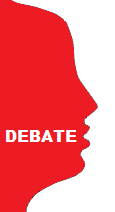

Previous Month | RSS/XML | Current | Next Month
WEBLOG
June 25th, 2020 (Permalink)
And Now Back to Our Regularly Scheduled Programming
I haven't posted a Debate Watch entry since March1, when all the madness started. Of course, the last of the Democratic Party debates was held in that month. With everything that has happened in the nearly three months since, I'd almost forgotten that this is a presidential election year. Then I happened to see that amid the epidemic of virus cases spiking and statues being pulled down, or whatever is the mass hysteria du jour, there will be three presidential debates and a vice-presidential one this fall2.
I'm pleased to see that each debate will have only a single moderator, according to the Commission on Presidential Debates (CPD)3, which sponsors them. One of my complaints about the recent Democratic Party debates was the proliferation of moderators until there was, at least once, more moderators than debaters, and yet the moderators still couldn't manage to keep order4.
One of the debates was originally scheduled to take place at the University of Michigan, but that institution has withdrawn from participation because of concern about hosting a large crowd in the midst of an epidemic5, and the event has been rescheduled for Miami, instead. I'm not overly concerned about such an event spreading the virus, since it's supposed to take place in October when transmission rates will probably be lower. Moreover, it's not likely that those persons at most risk from COVID-19―that is, the infirm elderly―will be attending. Also, anyone who is symptomatic can be stopped at the door and prevented from entering.
However, it's possible that a second wave of transmissions may start in the fall when temperatures drop. If so, rather than cancel the debates outright, why not hold them without audiences? The first televised presidential debates―those between Kennedy and Nixon―were held in a studio without an audience6. Moreover, the audience is usually told to hold its applause except at the beginning and ending of the debate, when they applaud like trained seals. In between, they are admonished not to clap or laugh. Nonetheless, recent moderators have found it impossible to control such reactions7, though those were debates with such candidates as Marianne Williamson, so it's hard not to laugh.
So, why not just have the debates without an audience? If the coronavirus leads to the CPD jettisoning the unnecessary distraction of studio audiences it will have accomplished one good thing. And, anyway, who wants to leave the house and risk a statue falling on your head, or being impaled on a spike of coronavirus cases?
Notes:
- And Then There Were Suddenly Only Two, 3/17/2020.
- Ed O'Keefe, "Biden says he'll participate in three debates with Trump", CBS News, 6/22/2020.
- "Statement: Second Presidential Debate", The Commission on Presidential Debates, 6/23/2020.
- See, for instance: The Big Democratic "Debate", Part 1, 6/27/2019.
- Simon Lewis, "University of Michigan pulls out of Trump-Biden TV debate; October debate set for Miami", Reuters, 6/23/2020. Notice the word "spiking".
- Jim Lehrer, Tension City: Inside the Presidential Debates, From Kennedy-Nixon to Obama-McCain (2011), p. 11.
- See, for instance: Debate Watch: And Then There Were Still Seven, 2/26/2020
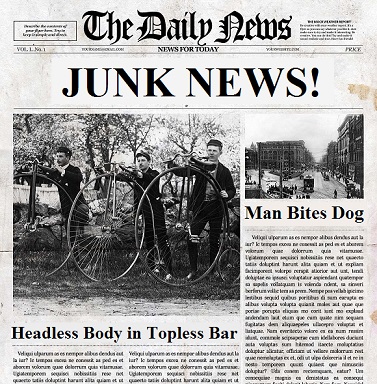
June 22nd, 2020 (Updated: 6/23/2020) (Permalink)
Spike It
The latest fad word in the world of American journalism is "spike". Supposedly COVID-19 cases are "spiking" in all of the states that are easing restrictions and restarting their economies. For example, here is a recent headline:
COVID-19 cases spike in Missouri for 2nd consecutive day1
Let's look at one aspect of the story under this headline in detail, namely, that having to do with the number of deaths due to COVID-19:
The number of deaths from the coronavirus in Missouri rose by 37 on Thursday, the second straight day that the state health department reported a big increase in fatalities. The Missouri Department of Health and Senior Services reported 27 deaths on Wednesday from COVID-19, the illness caused by the coronavirus. Bringing the total to 64 deaths over the last two days, which is the most deaths over two consecutive days since the pandemic began. St. Louis County has reported 41 new deaths in the last two days, and St. Louis accounted for another six.
Well, that sounds bad, but the article goes on:
Missouri health department spokeswoman Lisa Cox said in an email that the state "received a backlog of deaths from St. Louis County at once. That happened yesterday and again today. We haven't recently seen a day with a big spike in deaths that all occurred in the past 24 hours."
Wait a minute! What did she just say? 41 of the 64 deaths over the last two days―that is, almost 2/3rds of them―were part of a "backlog"? Does that mean the "spike" was at least partly due to a backlog? What is a backlog, anyway? Does it mean that the deaths had occurred over some longer period of time but were only reported in the last two days?
I contacted Cox by email and verified that some of the deaths reported on those two days may have occurred as much as several days earlier2. That means that what we have here is a reporting spike, not a spike in deaths. Yet, the first sentence of the first quote, above, states that "[t]he number of deaths from the coronavirus in Missouri rose by 37 on Thursday", which is alarming but inaccurate.
I would've thought the reporter would be curious about this backlog and ask a follow-up question, but that's all there is in this article on the subject. Later we read:
In [sic] St. Louis County, which has reported 5,731 cases and 544 deaths, has seen a steady decline in cases since peaking in early April. Despite this decrease, the county has seen large spikes in reported deaths in recent weeks, including six days of at least 11 new deaths since May 29.
Notice that the spikes are in "reported deaths", which we just learned from the health department spokeswoman may be at least partly due to backlogs in reporting.
Now, the problem with this particular story may be peculiar to the state of Missouri, though I wouldn't be surprised if other states have similar reporting systems that generate delays and backlogs. If so, then many of the spikes we keep reading about may be reporting spikes rather than spikes in either cases or deaths.
Update (6/23/2020): The Missouri Department of Health and Senior Services has what it calls a "Missouri COVID-19 Dashboard" on its website, which includes a graph showing deaths from COVID-19 in the state3. Yesterday, when I wrote the above entry, the graph only included deaths up to the 15th of this month, which is prior to the two days of supposed "spikes", which were Wednesday the 17th and Thursday the 18th of last week. Today, the graph was updated through the 18th, showing only one death on each of the two "spike" days, whereas according to the news story there were 27 deaths on the 17th and 37 on the 18th, so it would seem that the backlog was 62. Given the apparent delays in reporting in Missouri, it's possible that these numbers will be revised upward, but it seems unlikely that they will end up even close to the numbers reported on those days.
Also, the article claimed that there had been six spikes of at least eleven new "reported deaths" since the 29th of last month. I speculated above that these might be simply reporting spikes due to backlogs, rather than increases in actual deaths, and the graph seems to confirm this with no day showing greater than eight deaths since then.
The graph as a whole shows the bell-shaped curve of a normal distribution. The peak number of deaths, 29, was reached on April 23rd, and the deaths per day have been declining ever since, though of course it's been a bumpy ride. There's no sign of any "spikes" of deaths that could be caused by the recent re-opening of the state's economic and social activities.
Notes:
- Associated Press & Sam Clancy, "COVID-19 cases spike in Missouri for 2nd consecutive day", KSDK, 6/19/2020; all subsequent quotes are from this article.
- Lisa Cox, by email.
- "Missouri COVID-19 Dashboard", Missouri Department of Health and Senior Services, updated: 6/23/2020.
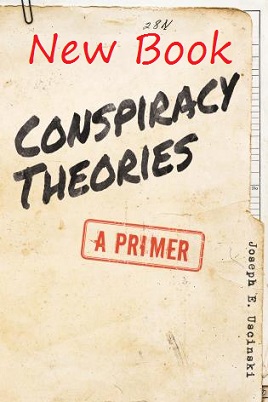
June 17th, 2020 (Permalink)
Conspiracy Theories: A Complete-Enough Picture
Title: Conspiracy Theories
Subtitle: A Primer
Author: Joseph E. Uscinski
Date: 2020
Quote: "This short book is a primer…. While a book of this length cannot provide a complete picture, it does provide, I believe, a complete-enough picture. I cover the major terms and concepts, and attempt to dispel some of the myths that have developed around conspiracy theories. … Social scientists have made many discoveries about conspiracy theories in the last decade; I have catalogued those here."1
Comments: Since this is a new book, I haven't been able to read the whole thing, but I have been able to read the preface, the first chapter, and part of the second. I make extensive comments below on those early parts of the book.
Joseph Uscinski is a political science professor who has written one previous book on conspiracy theories and edited another, neither of which I've read. Here's his description of what he's trying to achieve in the book:
[In Chapter 1] I have attempted to make the case that it is important to study conspiracy theories. In the next chapter, I will provide working definitions for the most frequent terms used to discuss conspiracy theories, starting with, of course, conspiracy theory. The remainder of this primer will introduce students to the latest research on conspiracy theories. In chapters 3 and 4, I will discuss the latest polling numbers and research by psychologists and sociologists. Chapter 5 addresses the political causes of conspiracy theorizing and the conspiracy theories endorsed by President Donald Trump and those surrounding his presidency. In the final chapter, I will discuss the effect of society's information-sources and address ways for mitigating the negative effects of conspiracy theories.2
As he indicates above, in the first part of chapter one, Uscinski argues that conspiracy theories (CTs) are important and that we should be concerned about them. I don't need any convincing of that, but one of the reasons he gives for their importance gives me pause:
Our epistemic authorities are not right all the time. Sometimes they are unintentionally wrong, but other times, they are wrong on purpose. In either case, the only way of ferreting out mistakes is through advocacy. … Conspiracy theories, even when they miss the mark, can make the case for increased transparency. … Over the long term, conspiracy theories could potentially incentivize good behavior: if the powerful intend to conspire, conspiracy theorists will be watching, investigating, and publicizing. This is a job that the press should be doing, but journalists have their own blind spots. Conspiracy theorists can bring to the fore problems that journalists miss.3
I'm skeptical about all of this except for the part about it being a job for journalists, who indeed often don't do it. I doubt it's a job for conspiracy theorists (CTists) for a number or reasons: For instance, suppose that a real conspiracy is stumbled upon by CTists; then the conspirators can dismiss the accusation of conspiracy because the CTists are not a credible source. For the same reason, many people would quite reasonably ignore the CTists' charges based on their past track record. Just imagine if the Watergate conspiracy had been uncovered by Mark Lane and Lyndon LaRouche instead of Bob Woodward and Carl Bernstein: who would have paid any attention except their acolytes? From the point of view of efficiency, it makes more sense to attempt to reform the practice of journalism so that reporters will be doing their job, rather than expecting cranks to do it.
As the old saying goes, a stopped clock is right twice a day, and if you believe enough CTs eventually you may hit upon a true one by chance. Uscinski would make a better case here if he could give even one good example of CTists exposing a real conspiracy. Instead, he claims that the CTs surrounding both the JFK assassination and 9/11 terrorist attacks increased transparency, and that we know more about them as a result. Instead, the CTs about these events, especially the Kennedy assassination, have muddied the waters and spread myths about them.
Uscinski goes on to do a good job, in this opening chapter, of explaining the extensive harm that comes from CTs. He also attempts to debunk some myths about CTs with mixed results:
- CTs are more popular or more numerous now than in the past.
For journalists, it's always fashionable to report a conspiracy panic, but the reports…are based on little more than feelings. There is no systematic evidence supporting any of them.4
I accept that there's no solid evidence that CTs are more prevalent now than they have been in the past, but I also share the journalists' feeling that there are more CTs and CTists now than in the past, and that the CTs have gotten loonier. I never heard of anyone doubting the moon landings until sometime probably in the '90s. Perhaps this was because everyone my age and older watched the various missions on television, and it's only younger people who are more distanced from the history who have trouble believing it. In any case, it's just a subjective impression, but my impression is that there are both more CTs and CTists, that CTs are more mainstream now, and that they are more extreme, which brings us to our next "myth":
- CTs are extreme.
I've tried to condense this section below, primarily by leaving out the examples, because I'm unsure what Uscinski is claiming:
Journalists often characterize conspiracy theories as extreme views, or as stemming from believers' extreme political ideologies. … But such claims depend first on how we define "extreme" and if we apply that definition consistently. … It is true that people on the political extremes believe conspiracy theories, but some conspiracy theories attract moderates. … People who have middle-of-the-road political views believe such conspiracy theories; the theories are therefore not strictly the province of society's political extremists.4
If Uscinski is simply claiming here that CTs are not believed exclusively by extremists, then that's surely true. However, Uscinski goes on:
We could define the content of conspiracy theories as extreme, but in order to do so, we would need an objective way to categorize some content as extreme and other content as not. However, such categorizations are often applied subjectively, if at all. …I do want to suggest that making clear distinctions…is a more difficult task than it first appears.5
I'm not sure, but Uscinski seems here to be claiming that you can't use a concept objectively unless you can define it precisely. However, vague terms cannot be defined precisely except by arbitrary fiat, yet we have no problems using such terms to apply to clear-cut cases. For example, "bald" has no precise definition, but we can tell that certain men are definitely bald and others are definitely not. It's only when we come to men who are losing their hair that we cannot apply the term objectively.
Similarly, some CTs are obviously extreme: those that claim the moon landings were hoaxes, that the earth is really flat, and that the world is ruled by reptilian aliens from another dimension, are held by small coteries of extremists. Such CTs are themselves extreme not merely because they are espoused by political extremists, but because they require such an enormous conspiracy that the conspirators must outnumber the small group of believers. Such CTs make the worst of the JFK assassination CTs look sober.
Uscinski ends the section with the logically weak claim that making the distinction between extreme and non-extreme CTs "is a more difficult task than it first appears." I'll grant that, but only when you're dealing with difficult cases and not for the ones I listed above and similar ones.
- CTs are for the mentally ill.
Many journalists dismiss conspiracy theories as a form of mental illness. Pejoratives like paranoid, crazy, and delusional are occasionally used. But there is little evidence to link conspiracy theories to any psychopathology (i.e., a mental or behavioral disorder). …[P]olls suggest that everyone believes in at least one or a few conspiracy theories. Unless we want to label everyone as mentally ill, then we should not suggest that conspiracy theories indicate a psychopathology.5
I don't know whether I count as a journalist, but I've probably used all of those words about some CTs and some of those who believe them. Moreover, I am unrepentant. I would certainly not use such words to describe everyone who believes one of the various JFK CTs: I disagree with them, but I don't necessarily think that they're nuts. However, I don't hesitate to describe the CT that we are secretly ruled by inter-dimensional reptilian aliens who disguise themselves as world rulers as paranoid, crazy, and delusional. If you believe that CT, seek psychiatric help.
Anyway, if all that Uscinski is claiming here is that not all CTs are crazy, nor all CTists paranoid or delusional, granted. But some are. The way I like to put this point is: you don't have to be nuts to believe a conspiracy theory, but it helps.
- CTs are believed by conservatives more than liberals.
…[T]here has been little systematic evidence showing that the right is more prone to conspiracy theorizing than the left in the United States. …[P]olls show that people on the political left (in the United States) are just as prone to conspiracy theories as people on the right. … Each side believes in conspiracy theories more or less equally, but they tend to believe in different ones that accuse the opposing side. An important point is that there is nothing inherent in Republicanism, conservatism, or right-wing politics that makes people more conspiratorial in their outlook, so there is no reason [to] expect that people on the right would partake in conspiracy theories more than anyone else.6
This is one that I strongly agree with based on long experience and observation. For instance, the JFK CTs are far more prevalent among liberals than among conservatives. Of course, some conservatives have their pet CTs too, such as the claim that President Obama was not born in the United States, or that global warming is a hoax. But I see no reason to think that the right is worse than the left in terms of CTs.
- CTs are more popular in the U.S. than in other countries7.
This myth is both good news and bad news: the good news is that there's no evidence to suggest that CTs are more popular in the U.S. than anywhere else; the bad news is that CTs appear to be just as prevalent in other countries as they are here.
In chapter 2, Uscinski defines "conspiracy theory" by first defining "conspiracy" in an odd way:
A conspiracy involves a small group of powerful individuals acting in secret for their own benefit and against the common good. Use of the term both in common parlance and in this text (rather than in legal terminology) suggests a large-scale attempt to inhibit rights, alter bedrock institutions, and commit large-scale fraud, most of which goes beyond traditional legal definitions of conspiracy. Therefore, this definition excludes planning to commit common illegal acts such as robbing a convenience store, killing a family member for the insurance money, or illicitly dealing narcotics.8
Notice that this is a stipulative definition of "conspiracy" since most conspiracies "in common parlance"―"planning to commit common illegal acts"―do not count under this stipulated sense. I assume that he is trying to obviate the usual claim by CTists that a CT is just a theory about a conspiracy, so that the "theory" that 9/11 was committed by a group of Al-Qaeda terrorists conspiring together would be a "conspiracy theory".
Uscinski goes on to define the full phrase as follows: "[A] conspiracy theory is an explanation of past, present, or future events or circumstances that cites, as the primary cause, a conspiracy9"―that is, a "conspiracy" in his stipulated sense. This, of course, makes this definition also a stipulated one, rather than a descriptive definition of how people actually use the phrase. One consequence of this definition, which I think the author intends, is that there can be true conspiracy theories.
This is not how I would define the phrase, since I think the stipulated definition of "conspiracy" arbitrarily excludes most actual conspiracies. I'll give my own definition, below, after we examine what the book has to say about unfalsifiability:
For the same reason that it is difficult to prove a negative, it is difficult to refute a conspiracy theory and show that there is not a shadowy conspiracy avoiding detection. For the conspiracy theorist, the fact that we don't have good evidence of a conspiracy only shows that the conspirators are good at convering their tracks. … Thus, conspiracy theories are non-falsifiable. Falsifiability is a hallmark of scientific thinking: if there is no evidence that could disprove a claim, then the claim―according to some philosophers―should be ignored. This might seem counterintuitive at first: Why would not being able to prove a claim wrong make belief in it irrational? The reason―in the simplest terms―is that when evidence cannot prove a claim wrong, evidence can't prove the claim right, either. At that point, the claim enters the realm of theology.10
I'm one of those philosophers he refers to, which is why I define "conspiracy theory" as a quasi-religious, unfalsifiable theory about a conspiracy, where both words are used in their everyday senses. So, a CT is a theory in the common meaning in which a "theory" is contrasted with a fact―"that's just a theory"―rather than in the scientific sense in which a theory must be falsifiable. The fact that CTs are unfalsifiable explains why it is usually useless to argue with CTists:
When you discuss with conspiracy theorists the veracity of their pet theories, an immediate question regarding falsifiability is: What evidence can I show you that would convince you that you are wrong? If their answer is "Nothing," then I advise you to exit the conversation.11
I second that advice.
Before ending this already long "New Book" post, I'd like to comment on the book's editing, which I think is an under-rated topic. This may seem like nitpicking, and a few nits are probably inevitable, but a lot of them makes for itchy reading. The excerpt that I read seems well-edited for the most part, but there's one egregious usage error in the following sentence: "One can even book a cabin on the annual Conspira-Sea Cruise, which allows passengers to not only heal from all of the conspiracies that have been perpetuated upon them but also watch for alien visitors in the night sky.12" All those conspiracies have been "perpetrated", not "perpetuated". "To perpetuate" means "to make perpetual", that is, to cause to continue indefinitely13. "Perpetrate" means to commit a crime, or other bad thing, such as a conspiracy14. The two words are so similar in spelling―they only differ by one letter―though not in meaning, that it's a tempting enough mistake to have made it into two dictionaries of common usage errors15.
Another annoying nit is that Uscinski uses the doublespeak phrase "sex worker" for "prostitute"16 in a discussion of CTs about sex trafficking17. It would be nice if editors would discourage the use of these kind of politically correct terms, but I suspect that they actually encourage it.
It may sound as if I'm being hard on this book, but it was very thought-provoking, as you can see by how much I wrote above about just the first couple of chapters. Minor criticisms aside, the part of the book I've read is well-written, especially for an academic book, and well-argued even when I disagree with it. I look forward to reading the whole thing.
Notes:
- Pp. vii-viii, emphasis in the original; page citations are to the new book.
- Pp. 13-14.
- Pp. 5-6.
- P. 11.
- P. 12; emphasis in the original.
- P. 12; there's an error in this passage which I have corrected in brackets: the text reads "is" but clearly should be "to".
- P. 13.
- P. 22.
- P. 23; emphasis in the original.
- P. 27; emphasis in the original.
- P. 27.
- P. 5; emphasis added.
- "Perpetuate", Cambridge Dictionary, accessed: 6/11/2020.
- "Perpetrate", Cambridge Dictionary, accessed: 6/17/2020.
- See:
- Harry Shaw, Dictionary of Problem Words and Expressions (Revised Edition, 1987)
- Bill Bryson, Bryson's Dictionary of Troublesome Words: A Writer's Guide to Getting it Right (2002)
- According to William Lutz, the phrase "sex industry worker" as doublespeak for "prostitute" goes back to at least 1988; obviously, the "industry" part has since been dropped. See: Doublespeak Defined (1999), p. 148.
- P. 8.
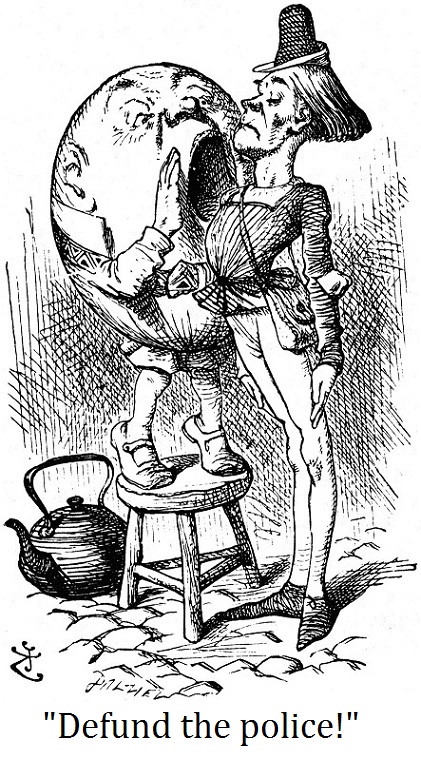
June 10th, 2020 (Permalink)
21st Century Humpty Dumpty
Alice was returning in the direction of the wall on which Humpty Dumpty had been sitting when she had last seen him. To her surprise, H.D. was back on his perch, but he was criss-crossed with cracks and bandages. Apparently, the nursery rhyme was wrong and all the King's horses and all the King's men had been able to put him together again, and back on top of the wall.
"Oh, Mr. Dumpty," she said, "I'm so glad to see that you survived your fall!"
"No thanks to the police!" H. D. replied.
"What did the police do?" Alice asked.
"It's not what they did, but what they did not do. They never arrested that little girl who pushed me!"
"Why I―," Alice began. Could he possibly be referring to her? "I'm sure no well-behaved little girl would have done such a thing."
"She must have! How else could I have fallen?"
"Well, you might have slipped."
"Nonsense!"
"What was this little girl's name?"
"Oh, some stupid name that didn't mean anything like Mary, Anne, or Jane―something like that."
No wonder the police had not found her, Alice thought. "What did she look like?"
"Oh, exactly like every other little girl. Two eyes like this," he said, poking the air in front of him with two fingers. "A nose like this," he added, making a vertical line between the two eyes with one finger. "And a mouth like so," he finished, drawing a horizontal line in the air beneath the eyes and nose.
"I can see why the police couldn't find her," Alice said, suppressing a smile.
"Abolish the police, I say!"
Alice did not quite believe her ears. "Would you tell me, please," she asked, recalling her last conversation with H. D., "what that means?"
"I mean 'defund the police', of course."
"But 'abolish' doesn't mean 'defund'!" Alice objected, since she was a well-educated girl who knew what both words meant.
"When I use a word," H. D. said, "it means exactly what I want it to mean."
"Well, I guess they would come to much the same thing," Alice said, "there would be no more police!"
"Of course there would be!" H. D. thundered.
"Then, I guess I don't know what you mean by 'defund'," Alice replied, remembering her previous discussion with the talking egg.
H. D. smiled tolerantly. "Of course you don't until I tell you. Defunding the police means shrinking the scope of police responsibilities and shifting most of what government does to keep us safe to entities that are better equipped to meet that need1."
"That's an awful lot to make three words mean," Alice thought. "The question is," she said aloud, "whether you can give words your own meanings that no one else understands. Words have to mean the same thing for everyone or we won't be able to communicate."2
"The question is," said H. D., "who is to be master. Good-bye!"
Alice remembered that in her previous visit H. D. ended their conversation abruptly, so she turned on her heel and left. "Well!" she thought as she walked away, "of all the unsatisfactory people I ever met, he's the unsatisfactoriest!"3
Notes:
- Christy E. Lopez, "Defund the police? Here's what that really means.", The Washington Post, 6/7/2020. See, also:
- Tessa Stuart, "A Practical Guide to Defunding the Police", Rolling Stone, 6/3/2020
- Matthew Yglesias, "Growing calls to 'defund the police,' explained", Vox, 6/3/2020
- Michael Balsamo, "When protesters cry 'defund the police,' what does it mean?", The Associated Press, 6/8/2020
- See: Nigel Warburton, Thinking from A to Z (2nd edition, 2001), "Humptydumptying".
- This story is based on: Lewis Carroll, "Chapter VI: Humpty Dumpty", Through the Looking-Glass and What Alice Found There (1896). The illustration is by John Tenniel; the caption is mine.
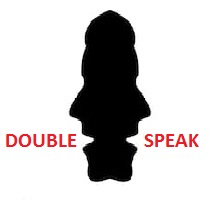
June 5th, 2020 (Permalink)
Another New Four-Letter Word
We saw last month that MSNBC reporters were instructed not to use the word "riot" in describing recent demonstrations1, and many reporters from other news outlets seem to also go out of their way not to call "a violent public disorder" a "riot"2.
Now, an Associated Press reporter claims on Nitwitter that the AP gives the following advice to its reporters:
Limit use of the term looting. Some have long viewed the word as carrying some racial overtones, particularly in the wake of natural disasters. Sensitivity is heightened now in light of President Trump's "looting and shooting" tweet and the history of that phrasing dating to the civil rights era. Instead, use a few more words and describe the actions: Some protestors broke into the store and stole whatever was on the shelves, for example.3
So, apparently, "loot" is also a new four-letter word. However, I haven't been able to verify that the AP actually gave this advice, though the person who tweeted it is apparently a local AP reporter. If it is genuinely from the AP, it must be recent since Trump's "tweet" was on the 28th of last month. Presumably, it's from an email or some other internal communication to AP reporters, rather than in the AP's published stylebook, the most recent edition of which is from last year. This year's edition is not scheduled to come out until later this month, but I was able to use Amazon's search function to search it for the word "loot" without result. If the AP did indeed issue the above advice, then some of its reporters are ignoring it, to their credit4.
The advice admits that "a few more words" will have to be used if the new taboo is not to be broken. The example sentence given in the above advice could be rewritten with the forbidden word as simply: "Some protestors looted the store", which has eight fewer words. Wordiness, or "gobbledygook", is the third type of doublespeak identified by William Lutz, about which he writes: "…[S]uch doublespeak is simply a matter of piling on words, of overwhelming the audience with words, the bigger the words and the longer the sentences the better"5. Such doublespeak uses language not to communicate, but to obscure and obstruct communication. I don't suppose that that's the intention behind discouraging the use of such simple one-syllable words, but it can well have that effect.
Words such as "riot" and "loot" are not loaded words6, rather they are words that have negative emotional charges because of what they describe. Similar words are "war", "murder", "rape", and "arson". It's not only impossible to accurately describe a riot without using such words, it's undesirable because doing so conceals the reality being described. For instance, other such terms are "broke into" and "stole". Why doesn't the AP recommend that its reporters "limit use of" those terms in describing looting? Here's a more fully euphemized version of the AP's example sentence: "Some protestors entered the store and took whatever was on the shelves".
The AP's advice is so short that the rationale for it is obscure. The first reason given is that: "Some have long viewed the word as carrying some racial overtones, particularly in the wake of natural disasters." The word has more overtones after a natural disaster? First of all, the recent looting is not after a natural disaster, such as an earthquake, but after man-made disasters, namely, riots. Secondly, the fact―if it is a fact―that some have "long viewed" the word as having racial overtones does not mean that it actually has them.
As far as I can tell, the complaints about the use of the word "looting" go back to 2010 and news reports about survivors of the earthquake in Haiti that year7. I agree that reporters shouldn't use the negatively-charged word "looting" to refer to desperate people taking food or other necessary items from abandoned stores after a natural disaster. Whether such use at the time had a racial component I don't know, though it's plausible. However, there's all the difference in the world between a mother taking milk and diapers for her baby from a damaged store after an earthquake, and those currently taking advantage of chaos to steal TV sets and break into cash registers. The latter are rightly called "looters".
Secondly, the advice claims: "Sensitivity is heightened now in light of President Trump's 'looting and shooting' tweet and the history of that phrasing dating to the civil rights era." Is the AP alluding to the debunked claim that George Wallace used the phrase8? Or should the word "looting" be forever banned because some obscure southern sheriff used the same phrase a half-century ago that the President of the United States used recently? I could see a rule against the phrase "looting and shooting", except in a direct quote, but why pick on "looting" and not "shooting"? The AP's rationale makes no sense.
There are two types of lies: lies of commission and lies of omission9. A lie of commission is what we usually think of when we think of a lie, namely, an intentional untruth. Such lies violate the requirement when testifying under oath of speaking "the truth…and only the truth". In contrast, a lie of omission is the failure to tell a truth when it is required, as in testimony, where it violates the further requirement to speak "the whole truth". In other words, lies by omission are what are called "half-truths".
Now, most of us are not lying by omission when we hold our tongues about something, because we are neither under oath nor otherwise required to tell the full truth. Journalists, in contrast, have a duty not to report by half-truths. It's not the job of reporters to hide from their readers what's really happening, but to describe it accurately. At least, that used to be their job.
Notes:
- A New Four-Letter Word, 5/29/2020.
- "Riot", Merriam-Webster, accessed: 6/3/2020.
- Kimberlee Kruesi, "Feels like a good time to post AP's guidance on the word looting:", Nitwitter, 5/31/2020; emphasis in the original.
- For example:
- Brian Melley & Kathleen Ronayne, "Newsom welcomes protest rage; decries violence and theft", Associated Press, 6/1/2020. Two occurrences of forms of the word "loot" not in quotations. However, "riot" only occurs in the form "riot gear", again raising the question of why the police put it on.
- Jim Salter, "St. Louis officers shot, ex-captain killed during unrest", Associated Press, 6/2/2020. One occurrence of "looter" not in quotations, but no occurrences of "riot"―instead, we have the mealy-mouthed word "unrest" in the headline, despite the fact that four police officers were shot and one man killed by the looters. If that's not a riot, then there are no riots.
I hope I don't get these reporters in trouble by pointing this out.
- William Lutz, Doublespeak: From "Revenue Enhancement" to "Terminal Living" (1989), p. 5.
- See the fallacy entry: Loaded Words.
- See: Alicia C. Shepard, "Is Looting a Loaded Word?", NPR, 1/20/2010.
- Dan Evon, "Did Trump and George Wallace Both Say, 'When the Looting Starts, the Shooting Starts'?", Snopes, 5/29/2020.
- See: Philip Houston, et al., Spy the Lie: Former CIA Officers Teach You How to Detect Deception (2012), pp. 52 & 237.
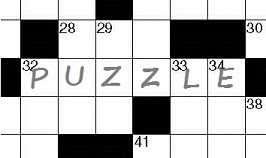
June 2nd, 2020 (Permalink)
Puzzler's Syndrome
99% of the patients in a mental hospital ward have puzzler's syndrome. This is a dangerous disease in which a person becomes so obsessed with solving a puzzle that he or she won't eat, sleep, or do anything other than work on the puzzle. There are 200 patients currently in the ward. How many patients with puzzler's syndrome would have to be discharged from the ward so that only 98% of the total patients in the ward would have it?
How many patients in the ward currently don't have puzzler's syndrome?
How many puzzler's syndrome patients would there have to be in the ward in order for the answer to the previous question to amount to 2% of the total number of patients?
100
Acknowledgment and Disclaimer: This puzzle is based on one from John Kador's How To Ace the Brain Teaser Interview (2005), puzzle 98. This puzzle is a work of fiction. There is no puzzler's syndrome. If you find yourself so obsessed with solving this puzzle that you don't eat, sleep, or do anything except work on it, consult a psychiatrist.

June 1st, 2020 (Permalink)
Standing Athwart Hysteria, Shouting "Stop!"
I don't necessarily agree with everything in the following articles, but I do recommend you read them. Also, as is my standard practice, these readings are offered as an antidote to the hysteria that continues to be promoted by the mainstream media despite all counter-evidence.
The following article by the author of last month's "New Book", Expert Failure, is on the failures of experts in the coronavirus epidemic. There's so much that is excellent in it that it's difficult to excerpt, though I try below just to whet your appetite. Please read the whole thing.
- Roger Koppl, "The fallen state of experts", The Critic, 5/7/2020
Epidemiologists tell us that if we do not hide in our houses with the door securely locked, hundreds of thousands will surely perish. Economists tell us that if we do not return immediately to work, civilisation will collapse. Good luck figuring out which expert has the better advice. …
Expert fear-mongering did not begin with the pandemic…. [T]oday's epidemiologists and economists have rigorous scientific training, mathematical models, advanced statistics, and careful evidence all going for them. True. But today's scientists are still people. And that means they respond to incentives just like everyone else. … Even when the experts are trying to be sober, scientific, and scrupulously neutral, they will feel certain pressures.
Think if it were you. You're an epidemiologist and the prime minister calls to ask you how many will die if we don't have a lockdown. What do you tell him? … Every number is a guess. If you give the prime minister a low number, there will be no lockdown. What if he accepts your low number and we have no lockdown? Maybe everything will be fine. But maybe there will be many more deaths than you predicted. You will get blamed. People will shame you as a bad scientist. And, because you are a good and decent person, you will feel guilty. Blame, shame, and guilt. This is a bad outcome.
If you give him a high number, there will be lockdown. No one will ever be able to say that your estimate was too high, because your estimate assumed no lockdown. Even if a lot of people die during the lockdown you can say, "See? Think how much worse it would have been without the lockdown." Thus, if you give the prime minister a high number, you will get credit for saving lives. … Praise, pride, and innocence. This is a good outcome. The logic of the situation is clear. You have every incentive to predict doom and gloom if no lockdown is ordered. …
Speaking of the limitations of experts on the coronavirus:
- James Freeman, "The Limits of Anthony Fauci's Expertise", The Wall Street Journal, 5/13/2020
Does Dr. Fauci still regard life under lockdown as merely "inconvenient"? Of course economics is not his field, but presumably as a U.S. citizen he has noticed the gargantuan impact of the government response to the virus. Yet there he was again yesterday on television encouraging more of the same as he remotely addressed a Senate hearing. "Dr. Anthony Fauci warns senators of 'suffering and death' if states reopen too early," says a CNBC headline. "Fauci warns that 'consequences could be really serious' if states move too quickly to reopen," announces the Washington Post. It's important to understand that Dr. Fauci is only focused on one set of consequences…. Dr. Fauci is clear on the fact that Americans should not rely on him to conduct cost-benefit analysis of the policies he is recommending. …
That's okay because that's not his job. Unfortunately, people have been acting as though it were. Also, while it's no doubt true that there will be "suffering and death" if states reopen "too soon", what's too soon? There will also be suffering and death if they reopen too late, and it's later than Fauci seems to understand. As Koppl explained in the excerpt quoted above, the incentives on someone in Fauci's position favor pessimism, which is why we continue to hear these pessimistic predictions which continue to be wrong. For instance, several states are reopening without a surge of "suffering and death", despite dire warnings:
- "Tracking what's happening in states as they reopen", ABC News, 5/29/2020
To examine whether the spread of COVID-19 may have been affected by the easing of social distancing restrictions, ABC News looked at the first 21 states to ease restrictions. ABC News looked at data from the following states: South Carolina, Montana, Georgia, Mississippi, South Dakota, Arkansas, Colorado, Idaho, Iowa, North Dakota, Oklahoma, Tennessee, Texas, Utah, Wyoming, Kansas, Florida, Indiana, Missouri, Nebraska, Ohio. Analyzing seven-day averages, there were no major increases in hospitalizations, deaths or percentage of people testing positive in any of the 21 states. … Although the daily numbers of positive cases increased in some states as the daily counting of COVID-19 numbers resumed at full-speed following Memorial Day weekend, a seven-day moving average gives a clearer picture of developing trends. … Some states may be reporting increases in the cases they find even if the virus is not spreading, because they are running a lot more tests. … We have also used The New York Times data to look at all 50 states and assess whether new reported cases have declined each day over the past two weeks. By that measure, no states have seen a consecutive decline for 14 days in a row in terms of new reported cases. But we should note that this does not mean states are not experiencing a clear downward trajectory when considering the entire curve. …
- Michael Hendrix, "Let the Sun Shine In", City Journal, 5/27/2020
…Rates of hospitalizations, cases, and deaths remain steady across Florida. … More than half of the state's known cases of Covid-19 are found in just four South Florida counties―the top out-of-state destinations for fleeing New Yorkers. As Politico recently concluded, "Florida just doesn’t look nearly as bad as the national news media and sky-is-falling critics have been predicting for about two months now." … In states such as Tennessee and Florida, where lockdowns are ending, infection rates are declining, not increasing, as JPMorgan Chase found, "even after allowing for an appropriate measurement lag." Rising case counts, where they occur, have more to do with increases in testing capacity than renewed outbreaks. This should encourage some humility from observers who feared the worst with reopening…. [Dream on.―Ed.] Florida's beaches and businesses are slowly opening, county by county, and life is returning to a semblance of normalcy. … The United States has reached a grim milestone: 100,000 deaths from Covid-19. In addition to its toll in lives, the virus has also ushered in an economic downturn as deep as the Great Depression nearly a century ago, with more than 38 million Americans having filed for unemployment.
No, it's not the virus that "ushered in" the economic downturn, it's the response to the virus. Perhaps that response was warranted and the economic damage it's done a price worth paying, but that remains to be seen. For one thing, we don't yet know the full extent of either the epidemic itself or the recession created by the response to it, and we won't know until next year at the earliest.
Also, instead of the "grim" but meaningless "milestone" of 100,000 dead, whose roundness is an artifact of our base-ten numbering system, an actually meaningful and important number is the fatality rate, that is, the percentage of those who die from the disease among all those infected. Last month, we saw why it's so difficult to determine that rate, but there has been some progress:
- Jacob Sullum, "The CDC's New 'Best Estimate' Implies a COVID-19 Infection Fatality Rate Below 0.3%", Reason, 5/24/2020
According to the Centers for Disease Control and Prevention (CDC), the current "best estimate" for the fatality rate among Americans with COVID-19 symptoms is 0.4 percent. The CDC also estimates that 35 percent of people infected by the COVID-19 virus never develop symptoms. Those numbers imply that the virus kills less than 0.3 percent of people infected by it―far lower than the infection fatality rates (IFRs) assumed by the alarming projections that drove the initial government response to the epidemic, including broad business closure and stay-at-home orders. …
[T]he projections that the CDC made in March, which predicted that as many as 1.7 million Americans could die from COVID-19 without intervention, assumed an IFR of 0.8 percent. Around the same time, researchers at Imperial College produced a worst-case scenario in which 2.2 million Americans died, based on an IFR of 0.9 percent. Such projections had a profound impact on policy makers in the United States and around the world.
…[A] problem with those projections, assuming that the CDC's current "best estimate" is in the right ballpark, was that the IFRs they assumed were far too high. The difference between an IFR of 0.8 to 0.9 percent and an IFR of 0.2 to 0.3 percent, even in the completely unrealistic worst-case scenarios, is the difference between millions and hundreds of thousands of deaths―still a grim outcome, but not nearly as bad as the horrifying projections cited by politicians to justify the sweeping restrictions they imposed. …[T]he CDC's current best estimates are surely better grounded than the numbers it was using two months ago.
For comparison, this rate is three times that for seasonal influenza of .1%, but it's less than a tenth of the 3.4% "crude" fatality rate announced by the World Health Organization, which was indeed crude. In any case, it's now clear that one reason the early forecasts were so far off is that they were based on fatality rates that were at least three to four times the true rate.
Previous Month | RSS/XML | Current | Top of Page | Next Month